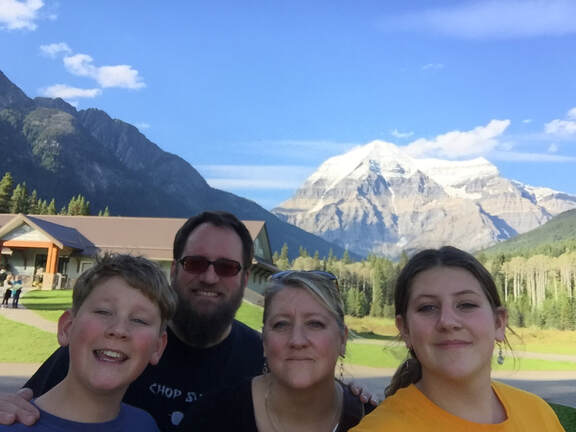Why am I doing a PhD? Probably at the top of my reasons is to model for my family the state of being curious and being willing to set off on an adventure, with or without a hankerchief. My personal and professional identities have always existed somewhere between the realms of Geography and Education, in many senses of both words, and the UNBC NRES Interdisciplinary Program is a great fit for addressing curiousity and furnishing an adventure within these areas. Beyond that, I hope to improve my qualifications for providing support of curriculum development and instruction among Social Studies teachers in BC, and provide more qualified advice and advocacy for K-12 Education in general, including teacher training programs.
As far as the inquiries and potential research themes that create curiousity for me -- at this moment -- I’m interested in storytelling in general, and specifically in the context of Social Studies classrooms (including History and Geography) in secondary schools, and the way in which teachers tend to build narratives (and often support grand narratives) in contrast to historical and geographic thinking concepts which tend towards the critical examination and deconstruction of narratives. These thinking concepts underpin the revised curriculum in BC in the form of curricular competencies, and thus require some kind of stance by educators in terms of curriculum design and pedagogy, as well as a willingness to engage in new learning about academic concepts that may not have been an expectation when they began teaching. Storytelling, however, is a natural resting spot for teachers and students alike, and a source of engagement, satisfaction, inclusion while at the same time cementing certain views of time and place, and creating as many fallacies and biases as it does revelations.
Storytelling and critical thinking, therefore, form a sort of dichotomy within Social Studies education; however, these two spheres do not neatly form a binary as they contain both complimentary and overlapping elements, and are informed by other stances that have the potential to make lasting bridges or at least make the differences creative, one of the most important of which is the First Peoples Principles of Learning, but also includes connection to place and expressions of identity. Mapping out the landscape of Social Studies education requires some understanding of the challenges faced by teachers in the planning and delivery of curriculum (and the professional development models used to support their pedagogy), as well as the actual curriculum experiences by students and the outcomes that arise from different philosophical approaches to classroom and curriculum design. In this curricular/geographic/identity context there is a research question lurking, perhaps something to do with the problems of practice that arise when teachers and students engage in storytelling about place.
As far as the inquiries and potential research themes that create curiousity for me -- at this moment -- I’m interested in storytelling in general, and specifically in the context of Social Studies classrooms (including History and Geography) in secondary schools, and the way in which teachers tend to build narratives (and often support grand narratives) in contrast to historical and geographic thinking concepts which tend towards the critical examination and deconstruction of narratives. These thinking concepts underpin the revised curriculum in BC in the form of curricular competencies, and thus require some kind of stance by educators in terms of curriculum design and pedagogy, as well as a willingness to engage in new learning about academic concepts that may not have been an expectation when they began teaching. Storytelling, however, is a natural resting spot for teachers and students alike, and a source of engagement, satisfaction, inclusion while at the same time cementing certain views of time and place, and creating as many fallacies and biases as it does revelations.
Storytelling and critical thinking, therefore, form a sort of dichotomy within Social Studies education; however, these two spheres do not neatly form a binary as they contain both complimentary and overlapping elements, and are informed by other stances that have the potential to make lasting bridges or at least make the differences creative, one of the most important of which is the First Peoples Principles of Learning, but also includes connection to place and expressions of identity. Mapping out the landscape of Social Studies education requires some understanding of the challenges faced by teachers in the planning and delivery of curriculum (and the professional development models used to support their pedagogy), as well as the actual curriculum experiences by students and the outcomes that arise from different philosophical approaches to classroom and curriculum design. In this curricular/geographic/identity context there is a research question lurking, perhaps something to do with the problems of practice that arise when teachers and students engage in storytelling about place.

 RSS Feed
RSS Feed